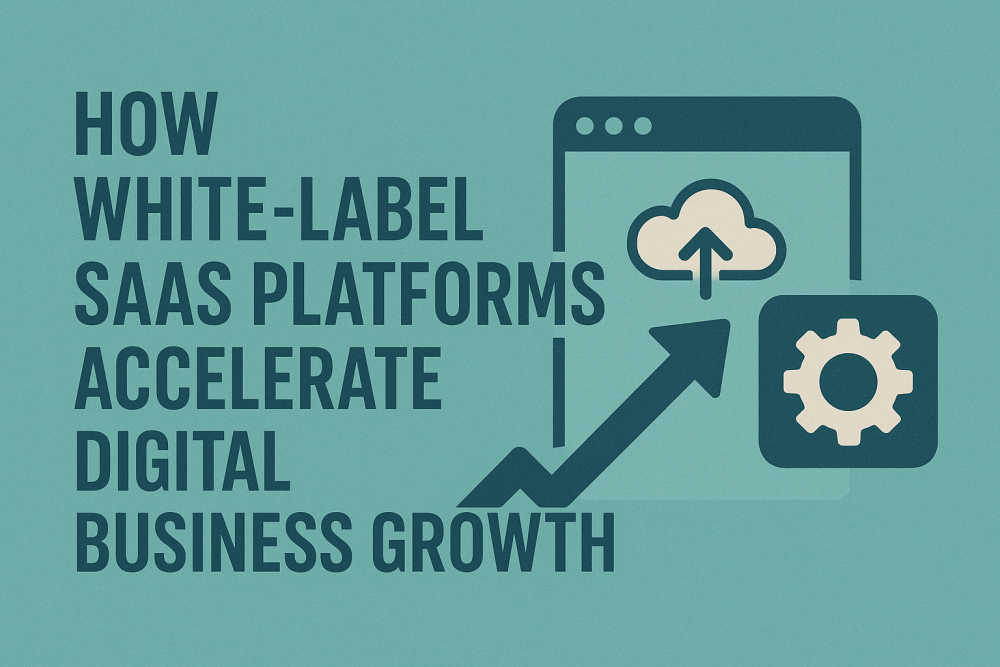In this era of digital transformation, businesses are constantly looking for strategies to expand rapidly without spending much time creating the technology from ground up. White-label Software-as-a-Service (SaaS) platforms have become a powerful option, enabling businesses to offer cutting-edge services under their own brand. Focusing on speed, adaptability, and scalability, these platforms assist organizations in enhancing their market position and generating new revenue streams.
The Concept of White-Label SaaS
A white-label SaaS platform is essentially a pre-built software solution that can be rebranded and marketed as though it belongs to you. Instead of investing years in development and testing, companies can quickly provide services like customer management, analytics, or marketing automation, which all are customized to their brand.
The biggest advantage here is speed. In sectors where consumer demands shift every few months, bringing a new product or service to market in weeks instead of months provides a significant competitive advantage.
Driving Business Efficiency
With white-label SaaS, companies don’t need to maintain heavy in-house development teams, big infrastructures, or deal with the headache of constant updates. Most of the time, the provider handles bug fixes, upgrades, and security patches. This takes a lot of weight off internal teams, who can instead focus more on customers and growth.
Another important point is cost. The subscription-based model makes expenses predictable and easy to manage, especially for small and mid-sized firms that want to scale but can’t afford over-spending on tech.
Expanding Revenue Opportunities
White-label SaaS does not only lower costs but it also creates additional revenue opportunities. A marketing agency might provide a branded email automation solution or a finance company could incorporate a client dashboard without needing to create one from the ground up.
This not only adds more value for customers but also boosts brand loyalty. Clients usually prefer sticking with providers who offer multiple solutions helping white-label platforms give businesses a smart way to retain and grow their client base.
Enhancing Customer Experience
Customers today want smooth, easy-to-use digital solutions, and white-label SaaS is built with that in mind. These platforms allow businesses to customize the interface, workflows, and dashboards to match their own brand identity.
This personalization goes a long way in building trust. When a client perceives that the solution has been tailored only for them, it fosters a deeper bond with business and enhances its reputation as an innovative tech service provider.
Supporting Scalability and Innovation
Scalability is one of the biggest wins of the SaaS model. As a business expands, it can introduce additional features, users, or integrations without requiring significant investment. This is the reason white-label SaaS is beneficial for both startups and established companies.
Many of these platforms also integrate advanced tech like AI, automation, and machine learning. Consequently, companies can provide innovative functionalities without needing to develop those technologies in-house. This keeps them ahead of competition in fast-evolving markets.
Compliance and Security Considerations
With data privacy and security being such hot topics, compliance is non-negotiable. Good white-label SaaS providers already stick to major standards like GDPR, HIPAA, or SOC 2. For businesses in sensitive industries like finance, healthcare, or e-commerce, this is crucial not only to avoid penalties but also to maintain customer trust.
Selecting the appropriate provider allows companies to avoid the need to develop security systems independently, as this aspect is already managed.
The Future of White-Label SaaS
As digital adoption speeds up, the role of white-label SaaS will only grow stronger. Companies everywhere are under pressure to innovate quickly, reduce costs, and keep customers happy. White-label SaaS checks all those boxes.
With developments in cloud tech, AI and integrations, these platforms are growing increasingly robust and simpler to tailor. It’s reasonable to assert that they will play a significant role in the future of digital commerce.
Conclusion
White-label SaaS platforms let businesses innovate quickly, cut costs, and expand services under their own brand identity. They have emerged as a crucial factor for digital business growth by providing scalability, efficiency and new sources of revenue. In the current environment where quickness and flexibility determine success, white-label SaaS is not only a cost-effective choice but also a wise long-term approach.
